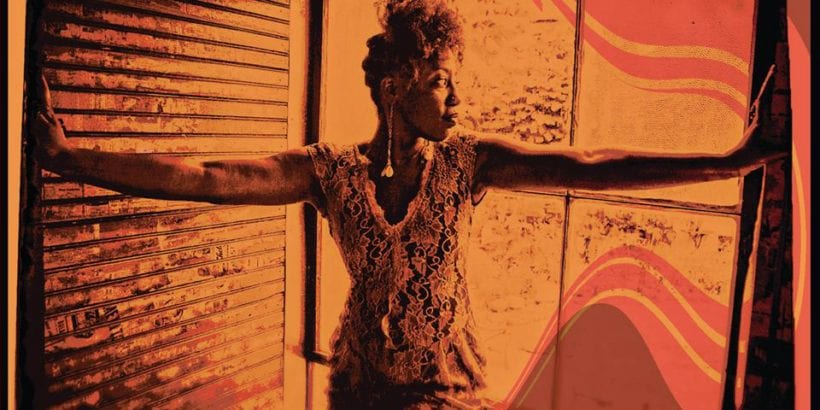
Erica Falls Rising: The New Queen of New Orleans Neo-Soul
In a city simmering with unrecognized and under-recognized stellar talents, Erica Falls wins the award for “Best Artist You Never Heard Of But Should,” hands down. A goddess of R&B and Soul, Falls walks in the footsteps of New Orleans’ legendary soul and jazz vocalists like Irma Thomas, Juanita Brooks and Charmaine Neville.
Having just won The Big Easy Award for “Best Emerging Artist,” Falls can honestly say that she’s been “emerging” for more than 20 years in and around her hometown of New Orleans. A native of the city’s Ninth Ward, she grew up the youngest of eight in a family that sang in church, where she discovered her musical talents. Family also introduced her to Roberta Flack, Aretha Franklin, Stevie Wonder, Nina Simone and Sarah Vaughan, who inform her music today.
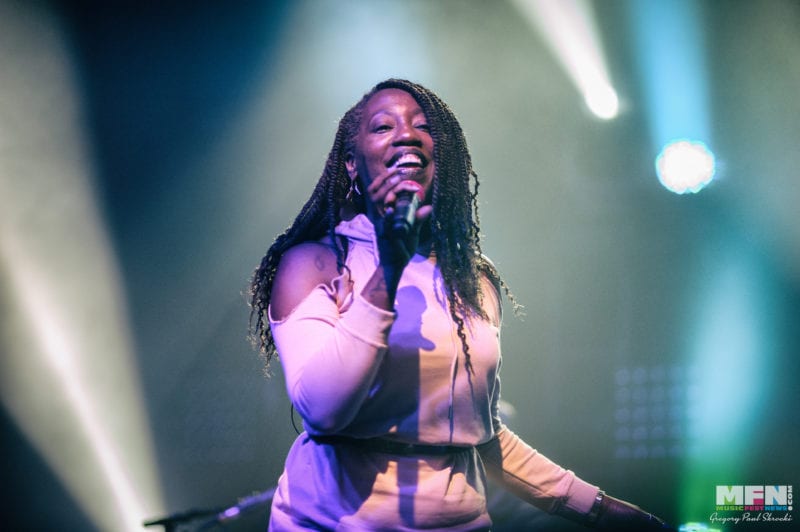
At one time, she had aspirations to open a hair salon but music clearly had other plans. She made her debut in the 90s on Bourbon Street with the cover band Nu Beginnings, but her career has since blossomed to include stints with Sting, Joe Sample, No Doubt and John Fogerty. She has also collaborated with such New Orleans legends as Irma Thomas, Dr. John and the late Allen Toussaint, and appeared as a singer in The Lee Daniels film, “The Butler” released in 2013.
Many of us know her as the dynamic, no-holds-barred, front-woman for New Orleans preeminent, power-funk band, Galactic, who she’s toured with for several years now. But she is a force to be reckoned with as a solo act too with a regular slot at The New Orleans Jazz and Heritage Festival and two gorgeous albums under her belt including 2011’s “Me Myself and I” and what will surely become a neo-soul classic, “Homegrown,” released last year to critical acclaim.
I had the overwhelming pleasure of speaking to this genuine, warm, beautiful and gifted woman not too long ago about her career, music, her craft, New Orleans and life in general. In the interest of full disclosure, I am a fan girl who has been known to ugly cry at some of her performances. The following is just two women talking about the things they love most in this world – music being one of them.

MFN: Erica, thank you so much for taking this time to talk to me. I’d like to start from the beginning. You grew up in New Orleans come from a family of eight. Are any of them musical?
EF: Five boys, three girls. We all sing. I am the only one that does it for a living. Even my parents sing. My mother sings and plays the organ and the piano. She was my first teacher.
MFN: Is that how you first came to music?
EF: I started playing piano and the violin. I played second string. I heard my mother singing in the house and playing the piano and her voice was just simply amazing. So, I figured I’d do something else because she had the singing department covered. So I did.
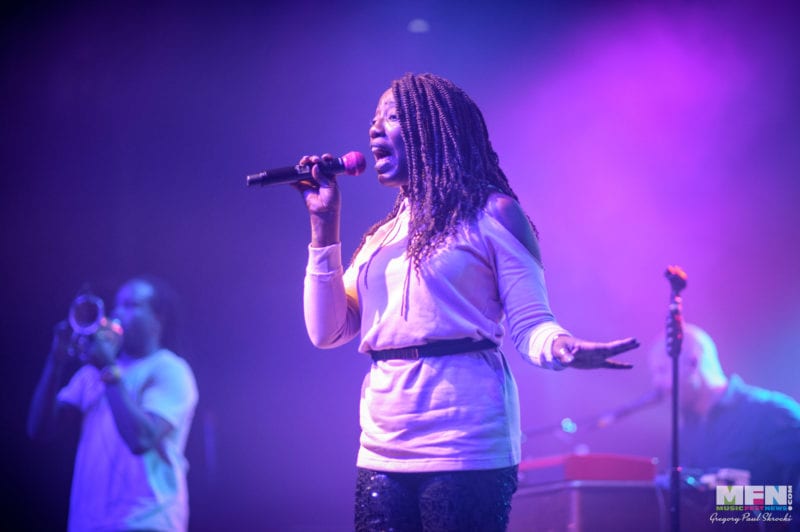
I played in the youth symphony, but that was a plus for me because it helped to develop my ears. So when I finally realized that I could sing, it gave me an advantage over most singers because I could differentiate the parts.
My mother was a schoolteacher. But she was also a musician and she played piano and organ and she just loved to sing and she only sang in church. My older sister sang in groups in high school and also in church, and so I would sit and listen to them rehearse. That’s why I always love to sing in groups because I came up underneath that.
MFN: I heard Troy Andrews, who we can agree is a prodigy, in an interview talk about how he really didn’t hone his craft until he got formal training at school learning the boring stuff, things like scales and proper technique. Did you go into that as well?
EF: I did. My vocal training came in high school. I had two of the best music teachers in the city. I went to two separate high schools. My first school was McDonogh 35. I had a music teacher there. Her name was Mrs. Seals – Patricia Seals. She was the first one to get hold of me.
But when I left and went to Francis T. Nicholls, which is where all my brothers and sisters graduated from, Mr. Ernest Paul was my music teacher. He was the one that really helped to define the craft. He really took the personal time with me.
I was kinda spoiled. He would write me passes to excuse me from class and I would go in his room and we would work on different songs and scales and training and he would put me in competitions. So, he’s the one that really helped to kinda take the rough edges off and taught me really what I know.
Those two teachers and what I learned from playing instruments helped me to teach a class. So I was over a choir at a creative arts school. A lot of them thought I had degrees, but I didn’t. This is from what I was taught from my teachers that I carry with me to this day.
MFN: I wonder in a city like New Orleans, where there is tremendous talent on the street corners alone, if that’s a common occurrence with teachers picking out students like you.
EF: It’s like if they see something in you and you have the willing spirit, they’ll help you to develop it. It’s so funny though, my music teacher, Mr. Paul, was also crazy about my older sister’s voice, Andrea. And when he learned that I was her little sister, that was it. He took me under his wing. He was a blessing to me.
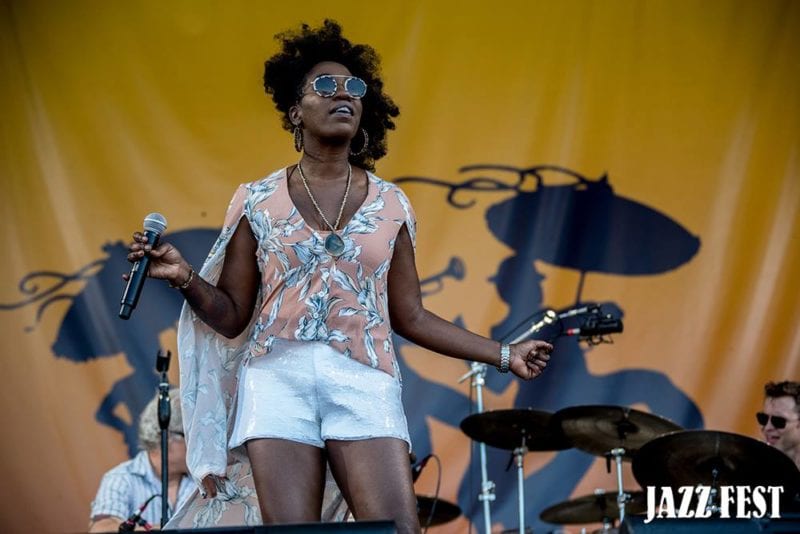
MFN: So those were your early influences. When did you first take music up professionally?
EF: Actually, I started singing when I was six months pregnant with my daughter on Bourbon Street. But I was in a venue. It was called The Old Opera House, and that’s when I really decided to start doing this thing. I always sang in groups and sang in church and in talent shows, but that’s when I was like, “Maybe I can do this for a living.”
But Bourbon Street is a tough place. Now it’s great for you to hone your skills. You can learn a lot. You know it’s a different house every 45 minutes. You have to learn to engage people — become an entertainer. But it’s rough. It’s a rough place.
It really helped to groom me. Now you don’t want to stay there, but it really can help groom you as an artist and an entertainer. Because you know you can quickly become the jukebox if you don’t know how to engage your audience. That taught me that.
MFN: Like so many musicians starting out, I know you had to do other things to support yourself. At what point were you able to pursue your passion without having to depend on something else for support?
EF: 2001. I lost my dad that year, and there’s an old saying that I used to hear my parents say, “Either shit, or get off the pot.” And I was like, “Okay Erica. What do you want to do? Are you going to sit on this, or are you going to move forward?” So, that gave me the incentive to say, “Okay, I’m going to do this.” And that’s when I decided to do it full-time.
MFN: From there, what was your first real professional gig?
EF: I was still gigging with other people at the time. And I always worked a job, and I realized I was taking off from the job to do the gigs. So I made the decision then to just do the music. And God opened doors, and it’s led me to where I am now.
It’s so funny. People always ask me, “Well, did you network?” Or, “Who did you meet? Well, I didn’t. Most times my phone just rang. I would pick up the phone, and this beautiful opportunity was waiting for me on the other side.
MFN: So the same people you gig with now, are those the same people you were running across then?
EF: Yeah. But they had no clue who I was. To say I’ve been around for a while, I’m still new to the scene, which works in my favor.
I’ve always admired people like the Nevilles and Irma Thomas. But I really wasn’t introduced to them until high school. I was a kept kid – sheltered, a church kid. My parents kept me really close. I was the baby. My first second line, I was a grown woman. It was like three, four years ago. I was a kept kid.
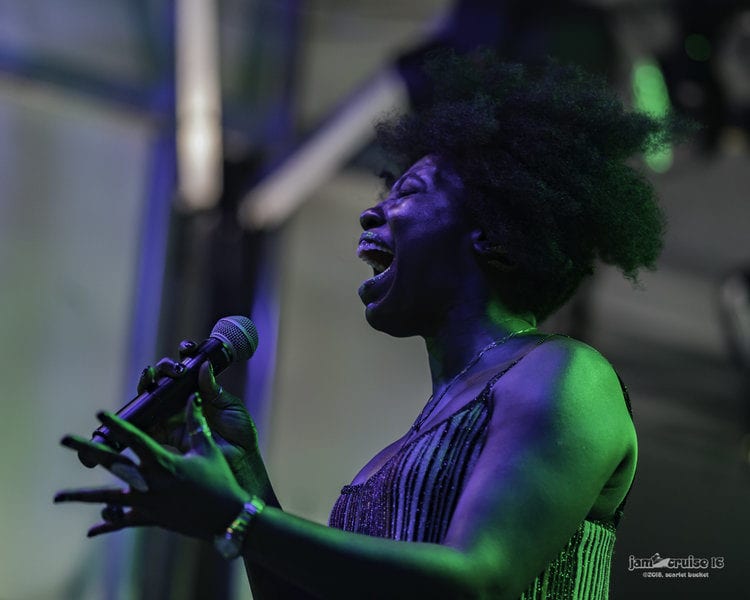
MFN: You’ve had a lot of professional influences, but, off the top of your head, can you name your top five?
EF: Allan Toussaint, Joe Sample. I’ve worked with both of them. Phenomenal. Irma Thomas. John Fogerty. I worked with him in the studio. Jennifer Hudson did a remake of “Rollin’ On The River,” and I was there for that session. Simply amazing.
I’d have to say my fifth person would be Cyril Neville. Cyril sings from the bottom of his feet. I love all of the Nevilles, but there’s something about when he delivers that song; he is truly telling a story, and you feel it. And so I’ve always connected to him out of all of the singers in that family. I was like, “Oh my God. That’s the one I like!”
MFN: You do that too. From the bottom of your feet on up, you do that. You’re singing from someplace deep. And as a fan — I’m not a musician — I don’t know the technical part of it, but I know what I love, and I know what touches my heart and my soul. And that’s how I listen to music. I don’t listen to it with my ears. I listen to it through my soul and my heart.
EF. That’s the spiritual connection of music. I always say I’m just glad to be a messenger. I hate when people say, “Oh superstar!” I’m not a superstar. I’m just a girl trying to pay my electric bill. But I’m a messenger for music. And it doesn’t matter if you speak English. No matter what the language, the connection is here (touches her heart). That’s what I love most.
Video courtesy of WFUV Public Radio
MFN: We know your own music but you’ve also been you’ve been the face of Galactic now for three years. How did that collaboration start?
EF: My phone rang. Corey Henry, the trombone player with them; I sang with his band at home – Corey Henry & The Treme Funktet. And at the time I knew that Galactic was in the market for another singer. And I heard quite a few stories that at first it was through Corey. But then I also heard it was through Trombone Shorty, and it was someone else, too, that they were the ones that mentioned my name to Galactic.
And so I got a phone call one day, and they wanted to know if I was interested in doing two shows with them. One was in Biloxi and the other one was in Baton Rouge, I think. And that was my very first two shows/audition, I guess, with them. And then I got the phone call again asking if I would like to tour, and I was like, “Of course! Yes. I would love to do that!” And here we are.
MFN: Let’s talk about your work at home. When did you first perform at Jazzfest on your own as Erica Falls?
ER: It was after Katrina when I did my first Jazz Fest – 2007/2008. Now I had done it before performing with other people, but never on my own.
I applied online and made the application. And I had applied quite a few times and wasn’t picked. But that year I was, and I’ve been doing it every since – not consistently, because they kinda stagger it with local musicians. But I got the call again this year, and that’s three years in row. And that is amazing to have that sort of love where you grow up – your stomping grounds.
MFN: So when you took that stage at Jazz Fest for the first time, what did that feel like as a native of the city?
ER: It was a lifelong dream. Congo Square is one of my favorite stages, and I’ve just always been in the audience looking at that and saying, “Man, that’s got to be an amazing feeling.” So when I did it for the first time, and I stepped out, I really had to compose myself, because it was bittersweet for me, because my dad was an avid Jazz Fest lover. And the fact that he wasn’t there to share in it was bittersweet. But it was just amazing at the same time. My mom was there and I had all of my brothers and sisters and everybody. And you know, just to have that support, and everybody was so happy and excited; it was a beautiful experience. And now to keep doing it, it gets better every time.
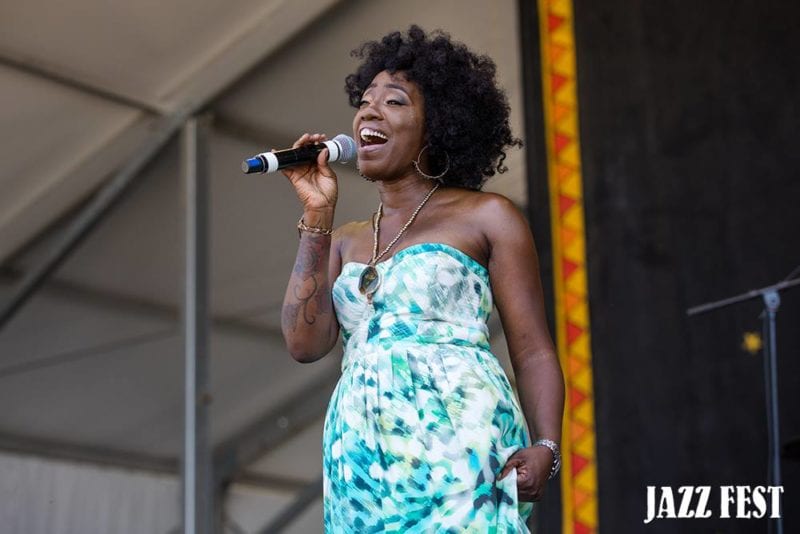
MFN: And home has obviously embraced you. You made this last gorgeous record (Homegrown) at home. Tell me about the inspirations behind it and the songs you picked.
ER: I co-wrote just about all of the record. But a lot of it is very personal. “Destiny” is really my life story. It was very hard for me to sing that song in the studio and live because I felt so vulnerable. And tears – oh my gosh. It was just a mess. I haven’t sung that song since Jazz Fest last year, because it’s just so emotional. I feel like I’ve taken a knife and cut myself down the center and opened myself up and said, “Okay world. Here I am.”
“Homegrown” – that song came about because I always get the question, “Girl, where you from? Where you been? Never heard of you before.” And I’m like, “Well I’m here now. I’m homegrown from the Ninth Ward.” And so that’s how that song came about.
The song “Alright” – that came from a relationship. And it’s so funny. I co-wrote this song maybe about 15 years ago with a guy, and I couldn’t remember the verses. So I rewrote the verses. I kept the hook, and I rewrote the verses to what I was going through at that time. And that’s how that song came about.
So a lot of my record is very personal, except for “Makings of Love” with Nigel Hall, where he did the music and I did the lyric. So it’s just like a groove I found on that. And I pulled from “Memphis Stew.” That’s how I came up with the title “Makings Of Love” because “Memphis Stew” is like they were putting all these things together to make that style of music. And so for me putting all these things together it was the makings of love. So that’s how that song came about.
And Tony’s song “Don’t Stop Your Lovin’,” the song I co-wrote with Tony Hall, he had most of the lyrics, and it was mainly a guy talking to a woman. So where I recorded it in studio – 636 studios- the owner is Leslie Smith, and she’s a songwriter as well. And she said, “Okay Erica. We gotta turn this thing around.” And I was like, “You know what? I think I’m gonna be a little sassy on this one.” And so that’s how “Don’t Stop Your Lovin’” came about. Because you know the lyrics go, “I’ve been out here on this road. Different cities. Singin’ at my shows. Wanna know that it’s me you’re thinkin’ about. And ya suffer when ya got to do without.” So, I was bein’ a little sassy.
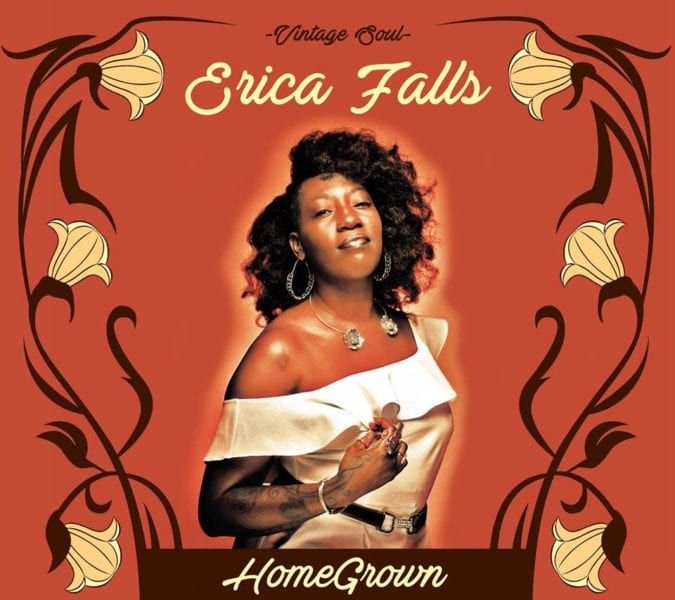
MFN: You have a winner in this record. It’s got legs. I know that, Offbeat Magazine knows that, everybody knows that. Did you know that?
EF: Honestly, I didn’t, because I grew into the record. The first two songs I recorded were “Old Records” and “Dreams.” And I worked with this guy named Wendell Tilley out of Nashville. And as I listened to myself sing those songs, until I got to Tony’s song and “The Makings Of Love,” I could hear where I grew.
So no. I really didn’t know that I had something. I just knew that I needed to express myself, and I wanted it to have quality, and to really say something that people can connect to. I just didn’t want it to be trendy. I wanted to have some stories because that’s what I grew up on. You know – Earth, Wind and Fire and Natalie Cole and Whitney Houston and Anita Baker, Esther Phillips, and Sarah Vaughan, and Billy Eckstine. Because my dad was an avid jazz listener and my mom loved gospel and we were all in the house. And one person was playing this music and that style of music. So there was always something going on in my house musically. All of those things were a part of me putting this record together.
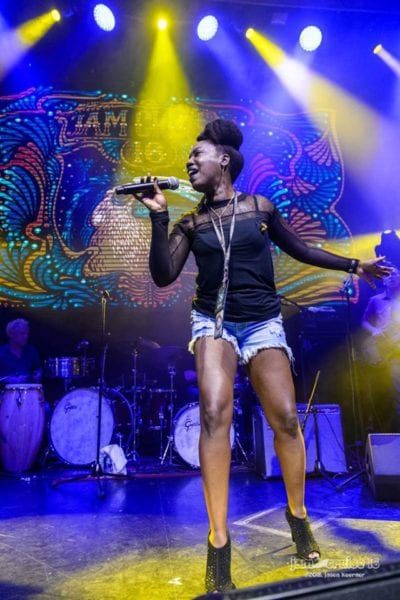
MFN: You’ve accomplished so much already, and you’ve got so much more to go. Is there a dream collaboration you could name, whether it be a band or person or a songwriter or a producer, who would it be?
EF: Okay. A songwriter that I would love to collaborate with, and you might say, “Whuuuhaaat?” John Mayer. I am such a geeky fan when it comes to John Mayer. His word play – I just love him. Something I wish I would have done before he passed was to have Allan (Toussaint) produce a song. Lemme tell you a special story.
It was end of JazzFest that year, and I might have had 14, 15 gigs. It was the year before he passed. And it was my last night, Sunday night. I’d done, during the day: Dr. John at Jazz Fest, and at night I was with Herlin Riley at Snug Harbor. Vocally just tired. Physically tired. And I’m sitting toward the entrance. And I look to where the stage is, and I see Josh (Feigenbaum), who is Allan’s partner. Now Allan has heard me sing with his unit but not outside of his unit.
“Lord ,” I said. “If Josh is here Allan is here too.” I looked a little further, and I see the white hair and suit jacket, and I’m like, “Oh crap! I cannot sound horrible now.”
So Herlin called me up on stage, and I do my thing, and (Allan) was sitting right down front. So as I’m coming off the stage, he helps me down. Now Allan is not a touchy person. He’s not a person to embrace or that sort of thing. And he gave me a hug and pulled me back and he said to me, “It’s nice to finally meet you.”
And it didn’t register at first. What do you mean? You know me. And then it hit me. He meant musically – to hear me do something outside of what I learned from his stuff, and to just hear me express myself as an artist. And I was like, wow. If I would have had the opportunity to have him produce a song, that would have been just a lifelong dream. And I think we were getting there, because he would call me for certain things outside of that. And then he left us.
So let me see. Who else? In my generation, I love Jill Scott. To be able to do something or sing with her, that would be just amazing.
Nina Simone. She’s another. Miss Nina! I just would have loved to absorb some of that sassiness she had – that just outright speak her mind – that sort of thing. And another person would be Stevie Wonder.
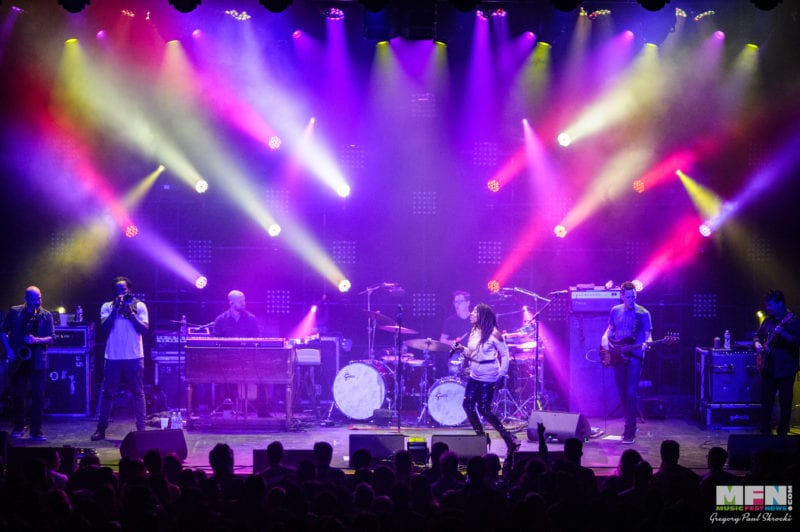
MFN: Last question, Erica. What’s next? What’s on your short-term agenda? What’s on your long-term agenda?
EF: Short-term agenda is to start getting myself – my unit – and really let the world see who Erica Falls is and just what I do. That’s the short term. So I’m working on setting up some tours. I just signed with a touring company, All In Touring, which is New Orleans-based, which is fantastic. So that’s the short term to really start touring and get myself out there.
The long term is to be successful. I don’t want to be famous. Fame can come one day and out the door the next. But success gives you longevity. I want to be like a Maceo Parker, or Allan Toussaint, or even Steel Pulse, or Gladys Knight. You know, people who are out there still looking good, still sounding good. I’ve been asked, “What is your end game?” Hey. If I can still do it, I’m doing this. There is no end game. This is it because this is what I love. It’s my lifeline. So why would I cut off my lifeline? Roll me to the microphone in a wheelchair, or give my crutches or my cane.
So that’s the long term – to just be successful at this. And to have longevity in it. And to still love it – to be a George Porter, a Leo (Nocentelli). And the fact that I have the support of legends like that that pull be to the side and say, “Hey, babe. How’s your business? How you doin’? I’m proud of you and what you’re doin’.”
Irma Thomas said something to me, and every time I talk about this I get really emotional. She said to me, “If I left here tomorrow, I know that what we did, what we built is being left in good hands.”
And I tell you, I cannot talk about that stuff. Because for her to go through and to live what we sit and read about – that history – that did it for me. So I know I have to do my best.
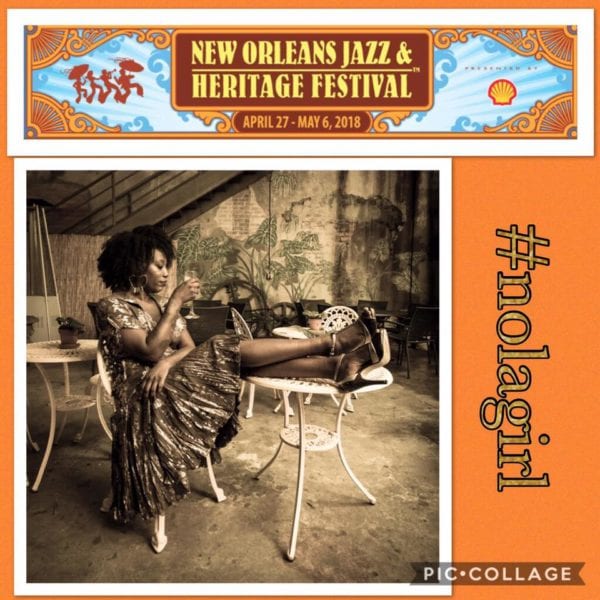
MF: If you’re lucky enough to be in New Orleans for Jazz Fest, you can catch Erica Falls on The Congo Stage at 12:30 p.m. on Sunday, April 29 and at nighttime shows throughout the city until May 6. Check the the schedule below. And if you can’t be in New Orleans this week, Galactic with Erica Falls will be coming to a city near you. Click here for tour dates.
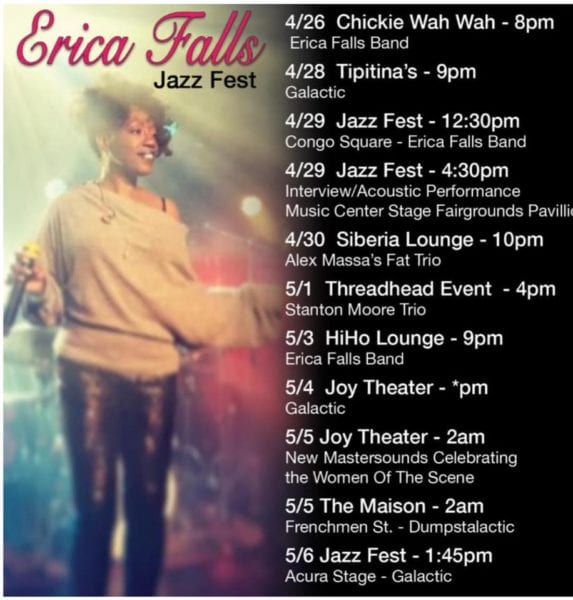
ERICA FALLS
WEBSITE
FACEBOOK
